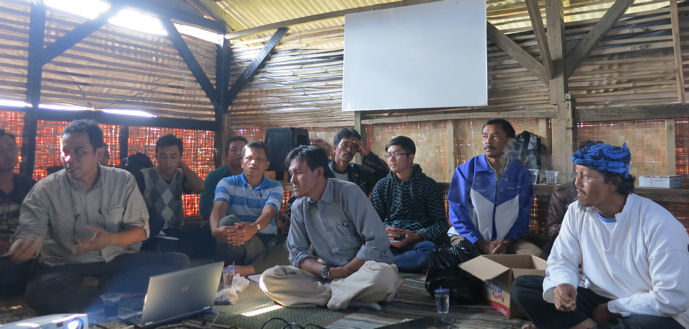Two of the first projects in Indonesia focused on the horticultural value chain. Their aim was to improve the quality of high-value crops and link smallholders to premium and export markets. These projects ran in West Java with vegetables and North Sumatera on citrus fruits. The Foundation teamed up here with the Agribusiness Market and Support Activity (AMARTA), the US Agency for International Development (USAID) project in Indonesian agriculture. This partnership ended in December 2010. (Here is USAID's report.)
A current project is devoted to an integrated approach for the semi-arid agriculture of West Timor, East Nusatenggara. Activities focus on soil and water management, quality seeds, simple agro-technology, and processing. The target is to increase the cropping season from one harvest per year to two or three. Smallholders will be growing rice, beans, corn, and vegetables in rotation. Government involvement is also intended to increase goat and cow populations. The project will emphasize integrated crop and livestock farming.
After a successful pilot in 2011, the Foundation scaled the project up
by replication in other locations. The planned long-term benefits include:
- increased and diversified production (corn yield to rise from 1.2 t/ha to 3 and later 5 t/ha),
- increased income, from $1.5/day to $2/day,
- three meals per day; improved child health.
Our partner in western Timor is now Lembaga Pusat Pelatihan Pertanian Dan Pedesaan Swadaya “Mardika” (Institute for Rural and Agriculture Training, known as P4S MARDIKA). This Indonesian non-governmental organization runs a rural development program in resource-poor areas of the province. It trains smallholders in good agricultural practices and crop cultivation, which contributes to local agribusiness growth and overall rural economic progress.
Read an October 2012 newspaper article about the work by P4S MARDIKA.

Our photo shows farmers at a seed production training session.
With its Seeds2B initiative, the Syngenta Foundation helps smallholders worldwide improve their yields. In Indonesia, another potato partnership is shaping up even better than expected. Here's how.
Raising income from vegetables
In Vietnam, our projects focus on poverty reduction and food security in the Provinces of Hoa Binh and Ha Noi. Activities concentrate on vegetables, with additional work proposed in rice, bananas, and corn, depending on the site. The aim is to support smallholders in producing safe high-quality vegetables for sale to supermarkets, thus increasing their income.
Reaching the necessary standards for urban supermarkets requires agronomic advice and the creation or improvement of screenhouses. These fine mesh constructions shade the crops and protect them from a number of insect pests. Training helps smallholders successfully adopt new technology and techniques. This includes advice on the best application of crop protection products. Avoiding unnecessary residues enables them to satisfy VietGAP protocols and supermarket quality demands, thus tapping into new sources of income. One of the projects is in a hilly area, and therefore additionally emphasizes practices that help the local corn growers avoid soil erosion. An important topic for rice farmers is the reduction of manual labor.
Local partners include the district farmers' association, the Vietnamese Plant Protection Research Institute and the Northern Mountain Agriculture & Forestry Science Institute (NORMAFSI). The Syngenta Foundation also works closely with the supermarkets, and helps build the smallholders' “brand“ with in-store promotion.
Project activities began in 2010. By the end of 2014, several Hanoi supermarkets had bought some 100,000 kg of the vegetables. Farmers supplied a further 900,000 kg of safe vegetables to the kitchens serving boarding schools around Hanoi. Screenhouse use has given an extra three crops per year and higher yields per crop. Stewardship training has saved two product applications per crop. Overall, farmers’ monthly income have increased by $32 per person.
Commenting on further progress by early 2013, the Foundation's Director in Vietnam, Dao Xuan Cuong, said:
"One of the big successes has been obtaining VietGAP certification for safe vegetables in TienLe, Hoaiduc district. Our projects' farmers now supply many thousands of Hanoi consumers. We are replicating this successful model in two other cooperatives at Duyenha commune, Hanoi." Cuong is understandably proud of the outcomes made possible by the Foundation's public-private partnerships. As well as healthy food for city dwellers and good cash incomes for farmers, he also sees another advantage: "The new technologies transferred in the project help vegetable growers to use labor more efficiently", he points out. "That saves them time to pursue other activities they couldn't before."
The projects have also become a model for educational purposes. Farmers from different locations participate in study tours; each year dozens of teachers and students come to practice their skills.
Dr. Nguyen Duy Luong, deputy chairman of the Vietnam Farmer Union (VFU), visited the Tienle project site in January 2015. Expressing his appreciation, he expressed the hope that the Syngenta Foundation would continue helping to expand the project model to other safe agriculture zones around Hanoi.
